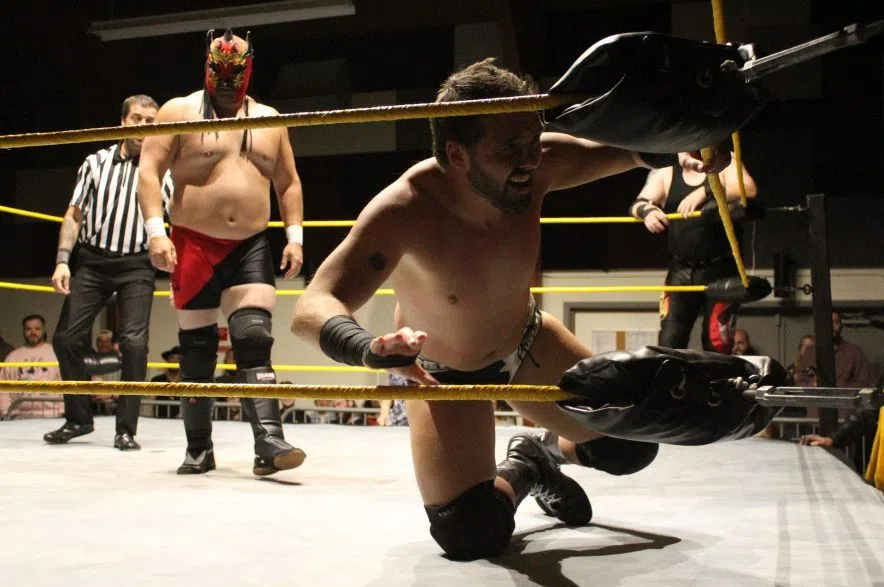The slap of a boot connecting with a jaw echoes through the hall like a shotgun blast.
A wrestler crumples to the mat. The crowd gasps, half in horror and half in awe. “He’s dead!” someone yells from the back row. (He’s not. He’ll be back after intermission.)
This is Prairie Pro Wrestling.
Read More:
- Superstitions at play: Saskatchewan Roughriders share their gameday rituals
- Vintage quilts, modern coats: A Saskatchewan crafter’s cozy transformations
- Meet the alpacas turning heads on a Saskatchewan grain farm
On show nights, the action unfolds at the Cosmo Senior Centre in Saskatoon, a modest venue with all the charm of a hometown hockey rink. The ring is set up just feet from the front row, folding chairs are packed with fans of all ages, and when someone gets body-slammed, you can feel it in your chest.
Listen to the story on Behind the Headlines:
And if you still think wrestling is fake, owner Roberto Ureta has something to tell you.
“Wrestling, by no means, is fake,” he said. “Sure, things might be predetermined at the end of the day, but I promise you, if you see someone get kicked in the face in the ring, they’re getting kicked in the face in the ring.”
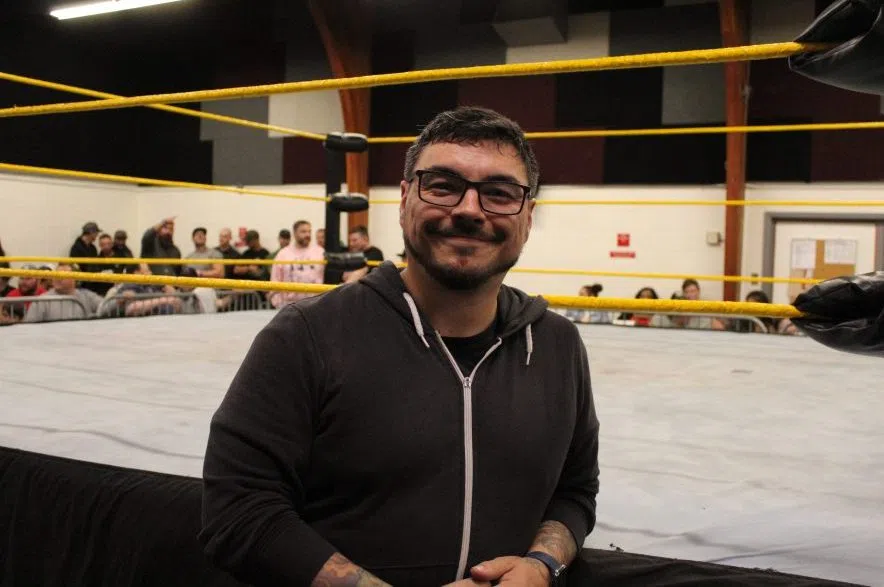
Even after 24 years in the business, Prairie Pro Wrestling founder Roberto Ureta still lights up like a kid on Christmas when the bell rings. (Brittany Caffet/650 CKOM)
Ureta would know. He’s been throwing out dropkicks and suplexes for almost a quarter century. That’s right — Ureta’s been in the wrestling world for 24 years and counting, and has run Prairie Pro for the past six years.
“I think I was 13 or 14 when I saw my first wrestling match. It was Shawn Michaels versus Yokozuna on a Monday Night Raw,” he recalled with a nostalgic twinkle in his eye. “I started loving it.”
Not just spandex and storylines
Don’t let the wild costumes and over-the-top personas fool you — this sport isn’t just play-acting. But, that being said, it does take some serious acting chops to pull it off.
Behind every body slam is a story. Prairie Pro Wrestling lives and dies on its characters: the heroes, the villains and the beautifully complicated weirdos who live somewhere in between. There are good guys to cheer for, heels to boo, and occasionally a twist that flips the whole thing on its head. That’s part of the magic.
But building those personas takes more than just spandex and stage presence.

For every heel and hero in the ring, there’s a story of sacrifice behind the scenes — hours of training, bruises and a passion that refuses to quit. (Brittany Caffet/650 CKOM)
“A lot of commitment, a ton of commitment,” Ureta said when asked what it takes to making it in wrestling. “If you’re serious about it, anyway. It takes a lot. It’s really hard on the body.”
The goal is to make people feel something — hate, love, shock, laughter — within the chaos of a choreographed fight. And sometimes that chaos doesn’t stick to the script.
“There’s an idea of what you want to happen, right? But when it comes to those two people that get in the ring together, sometimes it doesn’t always play out the way a promoter would book the match,” Ureta said. “It doesn’t turn out the way you want it to.”
The endings may be planned, the path to get there is often anything but predictable.
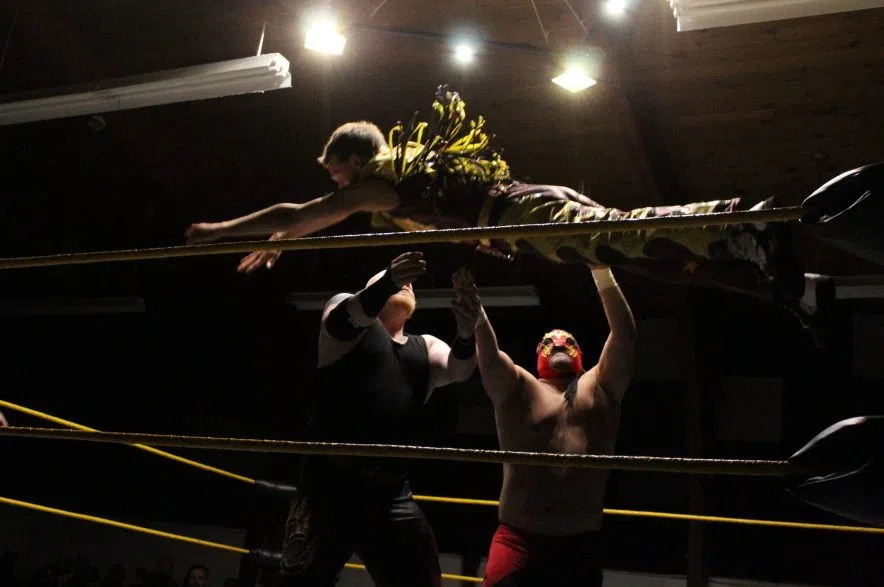
Muscle, motion and mayhem — a perfect leap in midair. This isn’t just athleticism; it’s theatre. And every slam tells a story. (Brittany Caffet/650 CKOM)
While the storyline may call for a villain’s comeuppance or a heroic comeback, the physicality is very real. Every bump, every throw and every flying elbow has to look and feel believable.
Yes, the punches land. And yes, the suplexes hurt. But at the end of the match?
“Do we hit each other? Yes, we absolutely hit each other,” Ureta said. “But at the end of the day, am I gonna go out and have a beer with a guy I just beat up? There’s a good chance. Very good chance.”
Big slams and big drama
If you think you know what it takes to be a wrestler, think again. It’s not just brawn — it’s Broadway meets a bar fight.
“When it comes to other sports, you’re there for the sport. For soccer or football or hockey, your talent is that sport,” Ureta explained.
“For wrestlers, their talent is to be physical, an athlete, and entertain. It’s a lot of different stuff grouped into one person, and that’s what you get when you see a wrestler in the ring. We’re a lot entertainer, a lot athlete, and at the end of the day, when the match is done… we’re sore.”
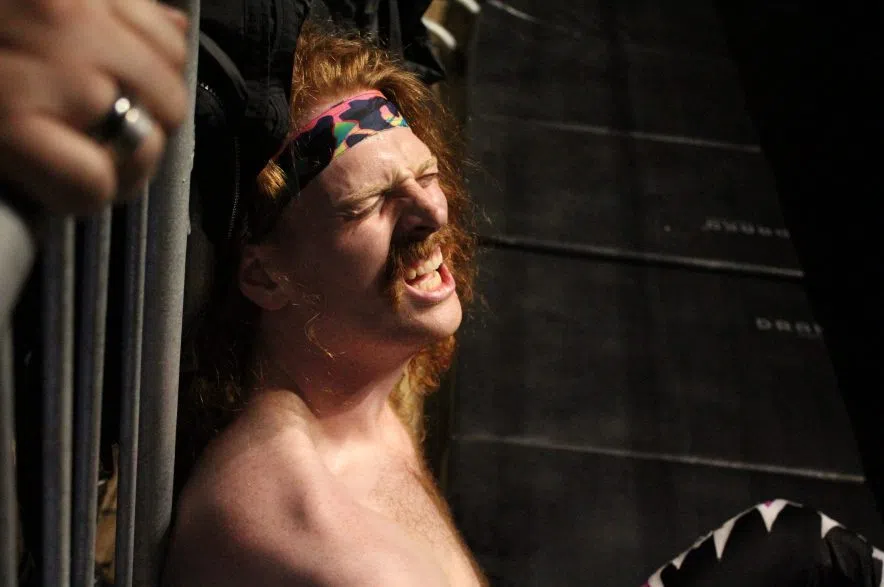
The front row isn’t for the faint of heart. One lunge out of the ring and the action could fall right into your lap. (Brittany Caffet/650 CKOM)
And speaking of sore: “To people that don’t have a passion for wrestling, it is terrible. It’s painful. I mean, right now I have knee injuries, I got a back injury,” Ureta shrugged. “I’m not hurt though. They’re just injuries.”
For Ureta, the pain is worth it for one reason: the roar of the crowd.
“Whether you’re wrestling in front of tens of thousands of people or hundreds of people, the feeling you get when you come out to the curtain… I can’t describe it to you. It’s just amazing,” he said.
“You go out, there’s either people booing or cheering. If anybody cheers for you at any point in your life for any reason, you feel good. And on the flip side, being a bad guy, the idea is you don’t want people to like you. So when people are booing you, you get the exact same feeling. It’s such a great feeling to go through the curtain and make people react the way you want them to react.”
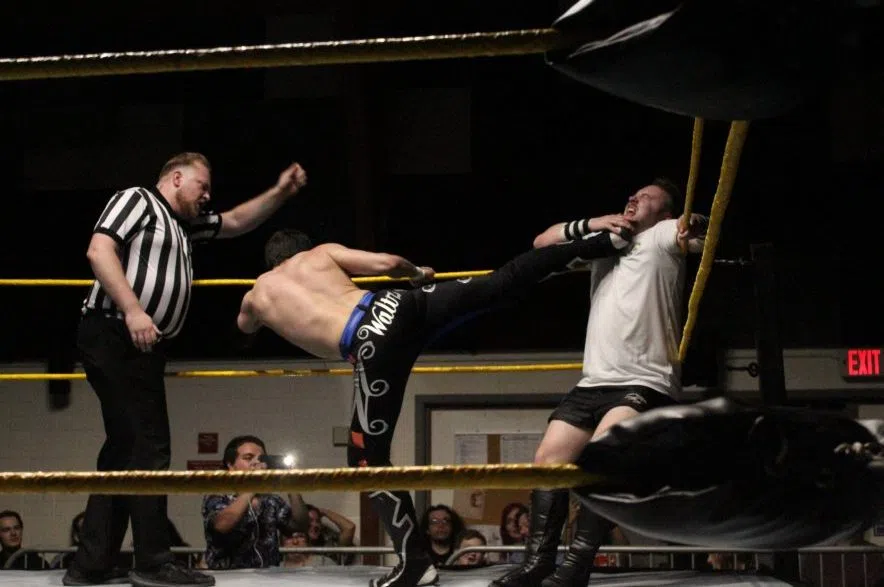
Roberto Ureta says wrestling isn’t fake — it’s a carefully crafted storm of real pain and raw emotion. In Prairie Pro’s ring, the bruises don’t lie. (Brittany Caffet/650 CKOM)
While things may get rowdy in the ring, it’s a show for the whole family.
“The show is family friendly. Some of the wrestlers may not be family friendly, but they are in check for the most part,” Ureta said with a laugh.
“They do get paid, so they have to follow some kind of guideline.”
But like any live sport, anything can happen.
“I’ve been in a few matches where things haven’t gone to plan. Sometimes, if someone gets injured really badly, we just stop,” Ureta explained.
“There used to be a time of professional wrestling where you get hurt and if you didn’t finish the match, you were looked poorly upon. Now things have changed.”
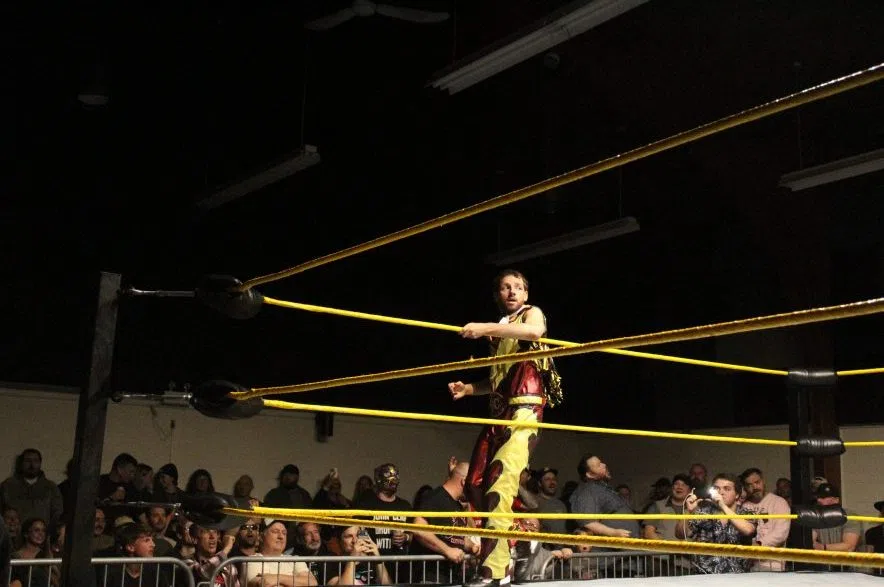
The crowd was all in — shouting, chanting, rising to their feet. At Prairie Pro, the fans aren’t just watching the story. They’re helping write it. (Brittany Caffet/650 CKOM)
The rules (and the fun of breaking them)
For curious newbies wondering how the rules work, Ureta breaks it down:
“To win, you have to pin your opponent’s shoulders to the mat for a three count. You’re not allowed to use the ropes to your advantage. Any illegal hold, like choking, is illegal. So a choke in wrestling is a forearm across the throat. You get five seconds to break it, or the ref can disqualify you. So you have 10 seconds to be outside of the ring. If you’re not back in the ring within 10 seconds, you lose. And typical stuff, you know, like no groin shots, no eye pokes, no eye gouging, no fish hook, stuff like that.”
And, yes, it’s illegal to pick up a chair and hit your opponent with it. Sometimes, anyway.
“That is definitely against (the rules) unless there’s a special match stipulation,” Ureta said.
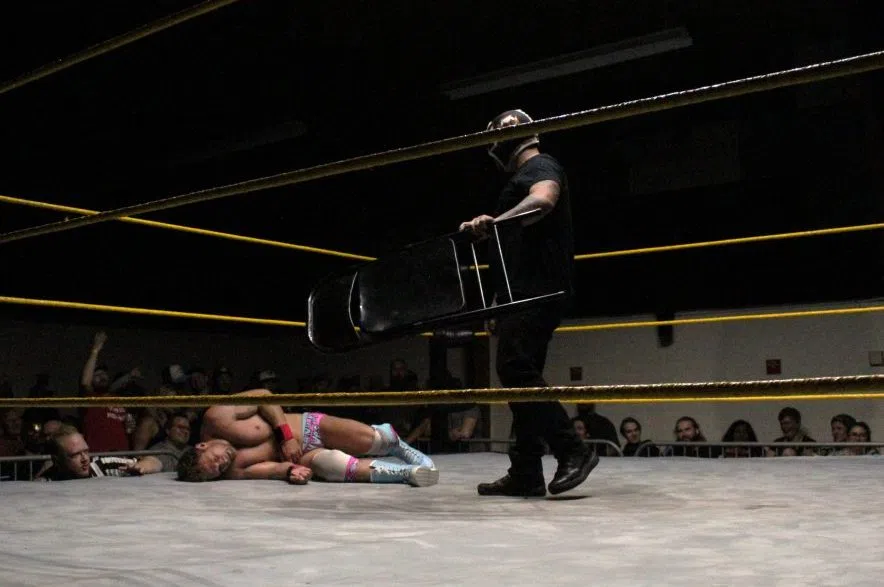
Boos rain down, but that’s the point. In Prairie Pro, the bad guys work just as hard as the heroes — maybe harder. Every glare and every insult is perfectly choreographed chaos. (Brittany Caffet/650 CKOM)
Prairie Pro has thrown down in all kinds of wild matches — ladder matches where wrestlers climb to grab a prize hanging above the ring, full-on TLC matches (that’s tables, ladders and chairs — where all those objects are fair game as weapons), and even a match featuring chairs wrapped in barbed wire. Yeah, it gets intense.
“If you’ve never been to a wrestling show, and you don’t know what to expect, literally, you can expect everything under the sun,” Ureta said with a grin. “There’s nothing off limits when it comes to a professional wrestling show, really.”
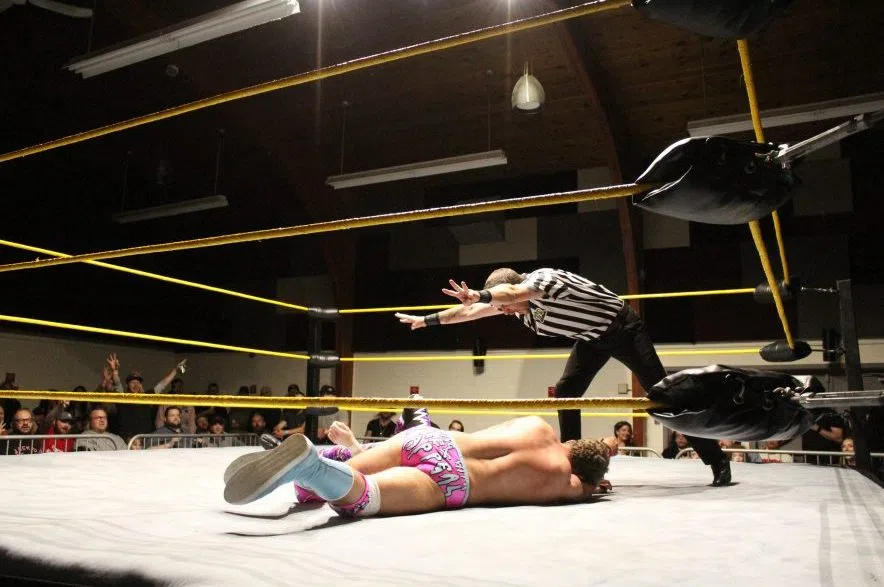
In wrestling, the referee’s job is simple: control the uncontrollable and avoid getting caught in the crossfire. (Brittany Caffet/650 CKOM)
And if you’re still on the fence, Ureta has a challenge for you:
“If it’s not your thing, or you think it’s not your thing and you’ve never been to a show, I challenge anybody, anybody, to come to their first wrestling show and not want to come back.”
Your move, Saskatchewan.
